Guest Editorial by Ernest A. Canning
 The ACLU attorneys representing the petitioners in League of Women Voters of Minnesota v. Ritchie [PDF] (Ritchie), which is scheduled to be heard by the MN Supreme Court on July 17, 2012, have set forth powerful arguments why the Court should remove a polling place photo ID initiative from the November 2012 ballot.
The ACLU attorneys representing the petitioners in League of Women Voters of Minnesota v. Ritchie [PDF] (Ritchie), which is scheduled to be heard by the MN Supreme Court on July 17, 2012, have set forth powerful arguments why the Court should remove a polling place photo ID initiative from the November 2012 ballot.
The MN Constitution mandates that a ballot question must truthfully inform voters of what it is they are voting on. The ACLU, following the same format it applied when it successfully prevented a similar photo ID initiative from being placed on the November 2012 ballot in MO, sets forth specific examples of how the ballot question, as enacted by MN's GOP-controlled state legislature, falls well short of that standard.
The ACLU argument may well succeed before the MN Supreme Court. However, as reflected by polls suggesting nearly 80% of Minnesotans support the adoption of photo ID restrictions, there is a very real prospect that the ACLU's legal objections will neither be heard nor understood in the utterly deceived court of public opinion...
ACLU's narrow legal challenge
The ACLU's legal task in MN is a bit more difficult than the one it faced in MO.
In striking down a previous photo ID law in Weinschenk v. State (2006), the MO Supreme Court had unearthed the truth about polling place photo ID laws --- that they have nothing to do with preventing voter fraud and everything to do with preventing a significant minority of citizens who do not tend to vote for Republicans from participating in our democracy. There, the MO Supreme Court expressly found that there had not been a single case of in-person voter impersonation --- the only type of voter fraud that can possibly be prevented by a polling place photo ID restriction --- in The Show Me State between the 2002 adoption of the federal Help America Vote Act (HAVA) and their 2006 decision.
Thus, when the MO GOP sought to foist photo ID restrictions upon The Show Me State by way of a ballot initiative that it described as the "Voter Protection Act," it was not all that difficult for the ACLU, in Aziz v. Mayer [PDF], to establish that the GOP was hiding its effort to destroy democracy under a label that was not merely deceptive but Orwellian.
In both MO's Weinschenk and in the WI cases, state courts measured the phantom menace of in-person voter fraud against provisions within their respective state constitutions which treat the right to vote as fundamental. As Dane County Circuit Court Judge Richard Niess found in League of Women Voters v. Walker, the "right to vote belongs to all Wisconsin citizens who are qualified electors, not just the fortunate majority from whom [the polling place photo ID statute] poses little obstacle at the polls."
In MN's Ritchie complaint, the named individual petitioners typify the type of otherwise lawful MN voters who are at risk of disenfranchisement by the proposed "government-issued" polling place photo ID restrictions. Gabriel Herbers is a 92-year old, blind nun who resides in an assisted living facility. Shannon Doty is a soldier deployed in Afghanistan. Gretchen Nickence is a homeless Native American whose only form of photo ID is her tribal ID card. Kathryn Ibur has a college-issued photo ID and a MO driver’s license.
Yet, unlike adversely affected voters in WI, the Ritchie petitioners are not in a position to challenge the merits of the proposed photo ID restrictions because the petitioners are not contesting a legal statute under the MN Constitution. They are challenging a ballot initiative, which seeks to impose a formal, polling-place, government-issued ID restriction by way of an amendment to the state's constitution. The petition in Ritchie exclusively focuses on whether "the ballot question truthfully inform[s] Minnesota voters what they are voting on?"
GOP's deceptive 'ballot question'
 The ACLU brief notes that where the initiative contains four substantive changes in MN law, requiring "(1) All voters 'voting in person' to 'present valid government-issued photographic identification before receiving a ballot'; (2) the State to 'issue photographic identification at no charge to any eligible voter who does not have' the requisite 'form of identification'; (3) a 'provisional ballot' for persons who are unable to present government-issued photographic identification; and (4) all voters be 'subjected to substantially equivalent identity and eligibility verification prior to a ballot being cast or counted,'" the ballot question simply states:
The ACLU brief notes that where the initiative contains four substantive changes in MN law, requiring "(1) All voters 'voting in person' to 'present valid government-issued photographic identification before receiving a ballot'; (2) the State to 'issue photographic identification at no charge to any eligible voter who does not have' the requisite 'form of identification'; (3) a 'provisional ballot' for persons who are unable to present government-issued photographic identification; and (4) all voters be 'subjected to substantially equivalent identity and eligibility verification prior to a ballot being cast or counted,'" the ballot question simply states:
There are a number of problems with that language, as the ACLU complaint explains.
1) Valid vs. 'government-issued' ID
The "valid" ID descriptor is misleading, the ACLU brief alleges, because it fails to inform voters that the proposed Constitutional amendment would limit "valid" ID to "government-issued" ID, making MN only the fourth state (after GA, KS & IN) to limit acceptable polling place photo ID to "government-issued" photo ID. This could potentially eliminate student IDs and employee IDs issued by universities and employers, respectively, and tribal IDs. It could lead to the exclusion of IDs from other jurisdictions, like an out-of-state driver's license for a student who would otherwise be entitled to vote if he or she resides in a dorm in MN, or a U.S. government ID (military, VA etc.).
2) 'All voters' vs. 'in-person voters'
The "all voters" description, the ACLU brief contends, is deceptive because it fails to inform voters that the photo ID restriction is limited to only those who vote "in-person." While many voters support the general concept of a photo ID restriction, they could well conclude that it would be "irrational" to limit a photo ID restriction to the polling place only, the place where voter fraud is least likely to occur, according to the ACLU.
That position is supported by academic studies, like the 2007 report [PDF], written by Law Prof. Justin Levitt of NYU's Brennan Center for Justice, which reveals that where there are occasional cases of absentee voter fraud, in-person voter impersonation --- the only type of voter fraud that could be prevented by the proposed MN Constitutional Amendment --- is virtually non-existent.
Indeed, as Levitt would later note in his sworn Sept. 2011 testimony before the U.S. Senate Judiciary Subcommittee on the Constitution, Civil Rights and Human Rights, out of some 400 million votes cast nationwide since the year 2000, there have only been nine (9) possible instances of voter impersonation. And, even that single-digit number may have been the product of nothing more than "poll worker error or voter confusion."
Nine (9)! That's less than the number of high profile Republicans, including Mitt Romney, who may have personally committed voter fraud by voting in precincts where they did not reside. Although Indiana already has a government-issued, polling place photo ID restriction in place, it did nothing to stop IN Secretary of State (and now convicted felon) Charlie White (R) from committing and being convicted of three counts of residence-based, felony voter fraud.
Although, as Levitt observed, you are more likely to witness someone being struck by lightening than encountering a case of in-person voter impersonation at the polls, the GOP insists there is a need for polling place photo ID restrictions that, nationwide, could potentially disenfranchise millions of voters.
The ACLU complains that the proposed amendment's "substantially equivalent" language is so vague that no one can possibly know what standard will be applied to absentee voters. Indeed, when the initiative was debated, its principle author, ALEC-connected Rep. Mary Kiffmeyer (R), insisted that the measure was "not intended to require absentee voters who vote by mail to present photo ID," yet, the ACLU adds, the GOP insisted on the "all voters" language in the ballot question even after Democrats complained that it was misleading to do so.
3) New provisional ballot system
The ACLU states that the ballot description is fatally flawed because it fails to inform MN voters that the proposed constitutional amendment would, for the first time, create a MN provisional ballot system.
Because MN is one of only a few states that offers Election-Day Registration (EDR), it is also one of only a few states that are exempt from the Help America Vote Act (HAVA) required provisional ballot system. The systematic change would materially alter how elections themselves are conducted in the Land of 10,000 Lakes.
Citing the U.S. Elections Assistance Commission (EAC), the ACLU brief explains:
The ballot question, the ACLU brief notes, fails to inform voters that MN "would be required to develop, implement, and manage an entirely new voting system at substantial cost and expense...Managing the provisional voting process can strain the capacity of election officials and cause substantial numbers of votes not to be counted."
It should be noted that right-wing activist groups have also mounted a frontal legal assault on Election-Day Registration in a federal lawsuit, arguing, as the Star Tribune reported, that state and local officials should be required "to fully check state databases on all voters who register at the poll to determine if they are eligible, or require many same-day voters to cast 'provisional' ballots".
In addition to arguing that this was a matter for legislative determination, not federal court intervention, lawyers representing MN and three counties countered, according to the Star Tribune, that the right-wing activists seek a system that assumes "voters are 'guilty' until proven otherwise, and that it would ultimately disenfranchise large numbers of people who register on election day."
The ACLU's arguments, on each of their points concerning the misleading language of the ballot question, are persuasive.
Refusing to defend photo ID amendment
Both MN Secretary of State Mark Ritchie (D), the named respondent in the ACLU challenge at the MN Supreme Court, and MN Attorney General Lori Swanson (D) have declined to defend the GOP drafted ballot question. Swanson explained that Ritchie's "public opposition to Voter ID created a serious conflict of interest that undermined his ability to perform his duties in responding to this lawsuit.
In response to a query from the Court, however, Ritchie informed "Chief Justice Lorie Gildea that the state needs a final decision in the photo ID case by Aug 27" in order to determine whether and, if so, in what form the ballot measure would be included on the November ballot.
The MN Supreme Court issued an order that permitted lawyers for the state legislature to intervene as respondents.
According to the Star Tribune, in their brief, the legislature argued that the MN "House and Senate have 'sole and exclusive authority' to write ballot questions and are not required to 'select a ballot question that is best and fairest that could have been framed by a trained lawyer'".
They argue that the ballot question "'adhered to long-standing tradition by generally describing the proposed amendment’ rather than listing every detail".
The power of unchecked propaganda
 "A lie can travel halfway around the world while the truth is putting on its shoes," Mark Twain famously said. The difficult battle against the GOP's long and well-funded "voter fraud" fraud bears that out.
"A lie can travel halfway around the world while the truth is putting on its shoes," Mark Twain famously said. The difficult battle against the GOP's long and well-funded "voter fraud" fraud bears that out.
It is ironic that so many citizens in the Land of 10,000 Lakes --- as high as 80% --- would still be taken in by the thick layer of lies that surround the ALEC/GOP push for voter suppressing photo ID laws. After all, it was Sen. Al Franken (D-MN) who so thoroughly demolished the credibility of GOP "voter fraud" salesman Hans Von Spakovsky and his "voter fraud" canard during the September 2011 hearings before the U.S. Senate Judiciary Subcommittee on the Constitution, Civil Rights and Human Rights. The hearings were convened in response to the billionaire Koch brothers-funded, Paul Weyrich co-founded American Legislative Exchange Council (ALEC)-fueled GOP effort to enact new state voting restrictions across the country.
The intriguing feature is that, because that state offers same-day registration and one of the nation's most liberal voter identification systems, MN has one of the finest records in voter participation in the nation. It ranked first in the nation during the 2008 Presidential Election, according to the ACLU brief and second during the 2010 mid-terms. In short, that is precisely the type of active democratic participation which the Weyrich co-founded ALEC seeks to eliminate via polling place photo ID restrictions.
"I don't want everybody to vote," Weyrich admitted (see haunting video at right) to a crowd of evangelical preachers in 1980. "Our leverage in the elections goes up as the voting populace goes down," he added after denigrating those who seek "good government" through maximum, informed voter participation, as people who suffer from what he described as "goo goo syndrome."
If a majority of Minnesotans either watched Franken's demolition of the "voter fraud" canard on C-SPAN during the September 2011 Senate hearings or read The BRAD BLOG with any regularity at all, they would realize that polling place photo ID restrictions have nothing to do with preventing "voter fraud" and everything to do with disproportionately disenfranchising poor, elderly, student and minority citizens. They would not be taken in by such right-wing sophistries as the notion that one must present a photo ID to board an airplane or to buy a beer --- itself, a canard since few citizens, after a certain age, are asked for ID to purchase an alcoholic beverage --- activities whose importance pales in comparison to the fundamental prerequisite that all citizens in a democratic society be afforded the opportunity to participate in elections.
But, alas, the vast majority of U.S. citizens have neither watched the C-SPAN video of the September 2011 hearings nor read any of nearly ten years of articles at The BRAD BLOG. The vast majority are bombarded daily, on the other hand, by an all-pervasive right-wing media that entails not only Fox "News" and right-wing radio, but multiple right-wing newspapers and think tanks --- all of whom have no problem at all repeating the lies in service of what they see as the greater good: holding or obtaining political power.
With certain notable exceptions, such as coverage by Rachel Maddow on MSNBC, the right-wing's "Big Lie" about "voter fraud" goes largely unchallenged within the corporate-owned mainstream media.
Indeed, often, as proved to be the case with The New York Times' repetition of the O’Keefe/Breitbart ACORN 'pimp' hoax --- even after Brad Friedman and others repeatedly exposed the falsehoods in their reporting --- the MSM has proved to be a willing perpetrator of these democracy-destroying lies.
So, when the press reports that as many as 80% of Minnesotans support the proposed MN polling place photo ID restrictions, reporters need look no further than a mirror to understand why.
Groups like the ACLU, the Advancement Project and the League of Women Voters have done a remarkable job in exposing the lie behind polling place photo ID restrictions in our courts. But, given the dismal failure of the corporate-owned MSM to so much as approach its Fourth Estate function of conveying truth to the American people --- coupled with the U.S. Dept. of Justice's unforgivable timidity in taking on new voter suppression laws in states that are not already covered by Section 5 of the Voting Rights Act --- the next phase of GOP voter suppression via photo ID ballot initiatives, may prove to be a far greater challenge.
Ernest A. Canning has been an active member of the California state bar since 1977. Mr. Canning has received both undergraduate and graduate degrees in political science as well as a juris doctor. He is also a Vietnam vet (4th Infantry, Central Highlands 1968). Follow him on Twitter: @Cann4ing.


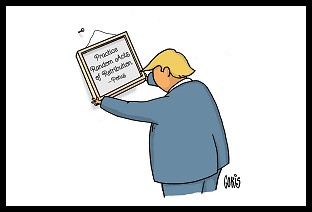 Sunday 'Random Acts of' Toons
Sunday 'Random Acts of' Toons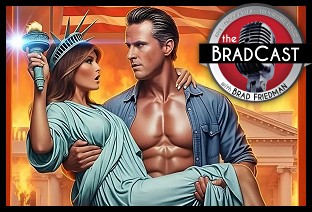 From CA's 'Nuclear Deterrence' Map to Newsom's Trolling to Trump's 'Fascist Theatre' and Beyond: 'BradCast' 8/21/25
From CA's 'Nuclear Deterrence' Map to Newsom's Trolling to Trump's 'Fascist Theatre' and Beyond: 'BradCast' 8/21/25 'Green News Report' 8/21/25
'Green News Report' 8/21/25
 On 'Americanism' and Trump's 'Stalinesque' Plot to Whitewash U.S. History: 'BradCast' 8/20/25
On 'Americanism' and Trump's 'Stalinesque' Plot to Whitewash U.S. History: 'BradCast' 8/20/25 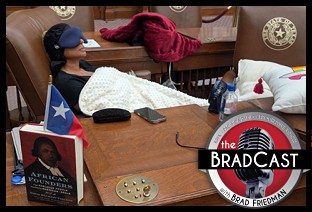 Texas GOP Imprisons Dem State Lawmaker in State House Chamber: 'BradCast' 8/19/25
Texas GOP Imprisons Dem State Lawmaker in State House Chamber: 'BradCast' 8/19/25 'Green News Report' 8/19/25
'Green News Report' 8/19/25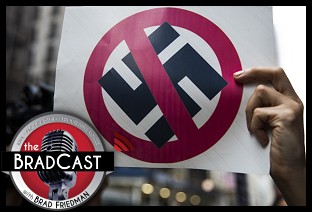 Trump, Nazis and
Trump, Nazis and 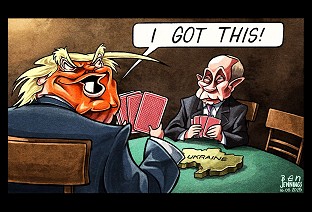 Sunday '
Sunday '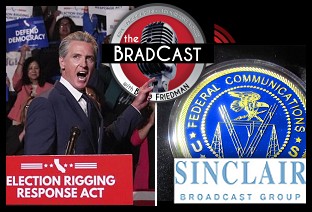 Newsom's 'Election Rigging Response Act'; FCC's License Renewal for Sock-Puppeting Sinclair: 'BradCast' 8/14/25
Newsom's 'Election Rigging Response Act'; FCC's License Renewal for Sock-Puppeting Sinclair: 'BradCast' 8/14/25 'Green News Report' 8/14/25
'Green News Report' 8/14/25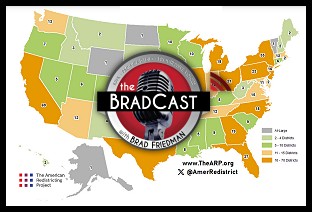 140 New House Reps?: Moving Beyond the Gerrymandering Wars: 'BradCast' 8/13/25
140 New House Reps?: Moving Beyond the Gerrymandering Wars: 'BradCast' 8/13/25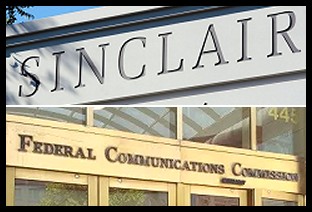 FCC Renews Sinclair TV Licenses Despite Complaint from Petitioner Who Died Waiting
FCC Renews Sinclair TV Licenses Despite Complaint from Petitioner Who Died Waiting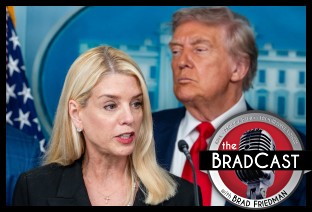 It's Not About the Rule of Law, It's About Authoritarian Control: 'BradCast' 8/12/25
It's Not About the Rule of Law, It's About Authoritarian Control: 'BradCast' 8/12/25 'Green News Report' 8/12/25
'Green News Report' 8/12/25 After Vaccine Cancels, CDC Shooting, Former Officials Want RFK Out: 'BradCast' 8/11/25
After Vaccine Cancels, CDC Shooting, Former Officials Want RFK Out: 'BradCast' 8/11/25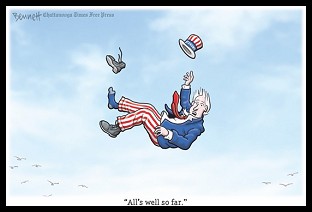 Sunday 'All's Well' Toons
Sunday 'All's Well' Toons 'Green News Report' 8/7/25
'Green News Report' 8/7/25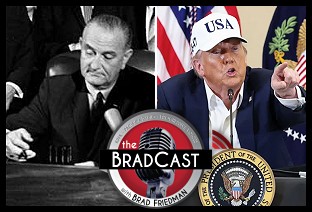 Trump Wars Against Greem Energy, Democracy on VRA's 60th: 'BradCast' 8/7
Trump Wars Against Greem Energy, Democracy on VRA's 60th: 'BradCast' 8/7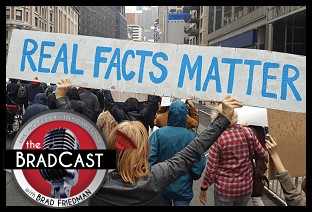 Media Conglomerates Continue Trump Capitulation: 'BradCast' 8/6/25
Media Conglomerates Continue Trump Capitulation: 'BradCast' 8/6/25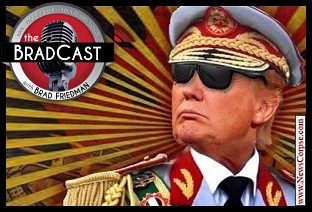 Banana Republican: Trump Shoots the Labor Statistics Messenger: 'BradCast' 8/5/25
Banana Republican: Trump Shoots the Labor Statistics Messenger: 'BradCast' 8/5/25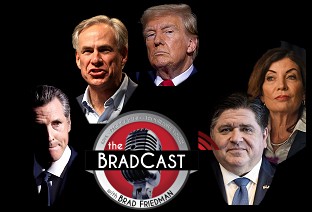 All's Fair in Love, War and, Apparently, Part-isan Gerrymandering: 'BradCast' 8/4/25
All's Fair in Love, War and, Apparently, Part-isan Gerrymandering: 'BradCast' 8/4/25 The Art of the Corrupt, Phony, Unlawful, Pretend Trade Deal: 'BradCast' 7/31/25
The Art of the Corrupt, Phony, Unlawful, Pretend Trade Deal: 'BradCast' 7/31/25 Battle Begins Against Trump EPA Climate Regulations 'Kill Shot': 'BradCast' 7/30/25
Battle Begins Against Trump EPA Climate Regulations 'Kill Shot': 'BradCast' 7/30/25 A Pu Pu Platter of Trump Corruption: 'BradCast' 7/29/25
A Pu Pu Platter of Trump Corruption: 'BradCast' 7/29/25 'Catastrophic' GOP Cuts to Medicaid, Medicare, ACA: 'BradCast' 7/28/25
'Catastrophic' GOP Cuts to Medicaid, Medicare, ACA: 'BradCast' 7/28/25
 VA GOP VOTER REG FRAUDSTER OFF HOOK
VA GOP VOTER REG FRAUDSTER OFF HOOK Criminal GOP Voter Registration Fraud Probe Expanding in VA
Criminal GOP Voter Registration Fraud Probe Expanding in VA DOJ PROBE SOUGHT AFTER VA ARREST
DOJ PROBE SOUGHT AFTER VA ARREST Arrest in VA: GOP Voter Reg Scandal Widens
Arrest in VA: GOP Voter Reg Scandal Widens ALL TOGETHER: ROVE, SPROUL, KOCHS, RNC
ALL TOGETHER: ROVE, SPROUL, KOCHS, RNC LATimes: RNC's 'Fired' Sproul Working for Repubs in 'as Many as 30 States'
LATimes: RNC's 'Fired' Sproul Working for Repubs in 'as Many as 30 States' 'Fired' Sproul Group 'Cloned', Still Working for Republicans in At Least 10 States
'Fired' Sproul Group 'Cloned', Still Working for Republicans in At Least 10 States FINALLY: FOX ON GOP REG FRAUD SCANDAL
FINALLY: FOX ON GOP REG FRAUD SCANDAL COLORADO FOLLOWS FLORIDA WITH GOP CRIMINAL INVESTIGATION
COLORADO FOLLOWS FLORIDA WITH GOP CRIMINAL INVESTIGATION CRIMINAL PROBE LAUNCHED INTO GOP VOTER REGISTRATION FRAUD SCANDAL IN FL
CRIMINAL PROBE LAUNCHED INTO GOP VOTER REGISTRATION FRAUD SCANDAL IN FL Brad Breaks PA Photo ID & GOP Registration Fraud Scandal News on Hartmann TV
Brad Breaks PA Photo ID & GOP Registration Fraud Scandal News on Hartmann TV  CAUGHT ON TAPE: COORDINATED NATIONWIDE GOP VOTER REG SCAM
CAUGHT ON TAPE: COORDINATED NATIONWIDE GOP VOTER REG SCAM CRIMINAL ELECTION FRAUD COMPLAINT FILED AGAINST GOP 'FRAUD' FIRM
CRIMINAL ELECTION FRAUD COMPLAINT FILED AGAINST GOP 'FRAUD' FIRM RICK SCOTT GETS ROLLED IN GOP REGISTRATION FRAUD SCANDAL
RICK SCOTT GETS ROLLED IN GOP REGISTRATION FRAUD SCANDAL VIDEO: Brad Breaks GOP Reg Fraud Scandal on Hartmann TV
VIDEO: Brad Breaks GOP Reg Fraud Scandal on Hartmann TV RNC FIRES NATIONAL VOTER REGISTRATION FIRM FOR FRAUD
RNC FIRES NATIONAL VOTER REGISTRATION FIRM FOR FRAUD EXCLUSIVE: Intvw w/ FL Official Who First Discovered GOP Reg Fraud
EXCLUSIVE: Intvw w/ FL Official Who First Discovered GOP Reg Fraud GOP REGISTRATION FRAUD FOUND IN FL
GOP REGISTRATION FRAUD FOUND IN FL

































